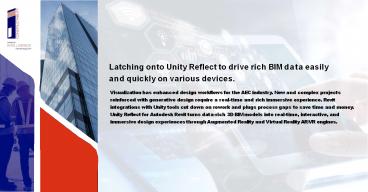Latching onto Unity Reflect to drive rich BIM data easily - PowerPoint PPT Presentation
Title:
Latching onto Unity Reflect to drive rich BIM data easily
Description:
BIM Engineering US is a leading Building Information Technology solution service provider offering end to end solutions in Mechanical, Electrical, Plumbing and Fire Protection systems engineering, design and construction. – PowerPoint PPT presentation
Number of Views:25
Title: Latching onto Unity Reflect to drive rich BIM data easily
1
Latching onto Unity Reflect to drive rich BIM
data easily and quickly on various devices.
Visualization has enhanced design workflows for
the AEC industry. New and complex projects
reinforced with generative design require a
real-time and rich immersive experience. Revit
integrations with Unity tools cut down on rework
and plugs process gaps to save time and money.
Unity Reflect for Autodesk Revit turns data-rich
3D BIM models into real-time, interactive, and
immersive design experiences through Augmented
Reality and Virtual Reality AR/VR engines.
2
Based on a survey conducted by Forrester
Consulting, 97 of the respondents say 3D in
real-time can transform processes workflows.
AEC firms are challenged by strict deadlines and
complicated project needs. Unity Reflect with its
suite of tools helps stakeholders tether BIM
information in real-time. Improved communication
and collaboration drives quicker
decision-making, bid success, error
identification, and more. Powerful Unity Reflect
algorithms can perform model renders at peak
frame rates on a myriad of devices and
platforms. Photo-realistic deliverables
distributed in AR/VR reinforced with high-quality
BIM data realize greater 3D visualization.
Setting up project data, design errors, metadata
loss, silo processes, communication gaps, and
erroneous design iterations are design challenges
that require powerful tools like Unity Reflect.
3
Adopting Unity Reflect in your Revit, Navisworks,
or SketchUp software drives a higher and
real-time 3D experience in AR and VR to plug
decision-making gaps regardless of model content
size, location,
or working device.
4
Cloud capabilities.
Teams and stakeholders using Unity Reflect with
BIM tools as Revit and Navisworks can gain
complete remote access to a federated model in
real-time. Connecting field operations to
back-office teams on various platforms augments
decision-making during design and
meetings. Quick Navigation. Exporting a BIM
model in Unity Reflect allows a seamless
experience for design teams and stakeholders to
navigate the model. Unity Reflect, with its
easy-to-use interface and functionality assists
technical and non-technical personnel to
navigate through the model.
5
Model object selection.
With every aspect of the BIM model being
selectable, teams can select design objects in
real-time with rich and organized metadata.
Building occupants can visualize the actual space
in 3D geometry before actual construction
begins. AR/VR and Mixed Reality. Rich BIM
content of a federated model can be viewed in
various formats viz. AR/VR and MR. Architectural
teams can enhance the design experience for
clients with a customized look and feel, create
bespoke viewers, and high-performance
environments.
6
Effective tools from Unity Reflect help extract
and connect geometry into Unity. Knowing the
material and structural properties attached to
real-time geometry helps strengthen BIM
integration in comparison to standard APIs.
Information is no longer locked in the BIM tool
which opens up powerful capabilities of AEC
workflows.
7
BIM object filtering capabilities in Unity
Reflect can help separate objects like walls,
ceilings, columns, etc. Metadata visualization
in real-time can be reinforced by color-coding
objects for dimensions, materials, logistics,
etc. Building multiple connectors for Unity
Reflect will help AEC teams push data into other
software like Rhino, Sketchup, etc. Teams can
save time to document field conditions with
greater site visualization based on a VR
experience through AR/VR headsets. Optimizing the
BIM model in real-time 3D helps stakeholders
leverage simultaneous visualization across
various locations. The applications could be
multiple viz. reviewing designs, optimizing
data, immersive collaboration, etc.
8
Top features of Unity Reflect for Autodesk Revit.
11 model scaling in Augmented Reality Connecting
BIM metadata within a 3D experience View Revit
authored models in AR and VR Communicate and
collaborate on design intent Enhance design
reviews through team collaboration Share and
access 3D models on multiple devices and
platforms Cloud connectivity for multiple
projects, teams, and other collaborators Build
bespoke AR/VR/MR applications for real-time 3D
9
Users can leverage two Unity Reflect tools viz.
Unity Reflect Review and Unity Reflect Develop
Unity Reflect Review. Teams and collaborators can
get 3D models from various tools like Revit,
Navisworks, Sketchup, etc. into Reflect to
review models in a collaborative and immersive
environment. Top advantages of Unity Reflect
Review. Identify errors early in the design phase
to avoid expensive rework Facilitate quick and
informed decision-making within a 3D immersive
environment Draw multiuser collaboration with
annotations and walkthroughs Access 3D model
content on the fly through compatibility on
various devices viz. Android, iOS, AR/VR,
etc. Understand and approve design intent with
model overlaying in 11 and integrating BIM
metadata
10
Unity Reflect Develop.
Unity Reflect Develop enables designers and
engineers to build customized solutions or apps
that fit unique project workflows. Developers
can leverage this tool to customize the designing
of digital twins, project sequencing, BIM model
coordination, and more.
- Top advantages of Unity Reflect Develop.
- Complete and accurate data creation from various
BIM software to create 3D to 7D deliverables and
outcomes - Import and stream large and highly detailed 3D
models Build reusable solutions for multiple
projects - Augment app development with in-built APIs,
samples, etc.
11
Conclusion.
Unity Reflect has been a game-changer for the AEC
industry. With the ability to build quick and
detailed real-life experiences from 3D BIM
models, architects and designers can be swift
with their designing workflows. Effective
communication of design intent to teams that have
built them fosters positive results and clear
feedback to save on time and cost.
Visit Us www. bimengus. com































